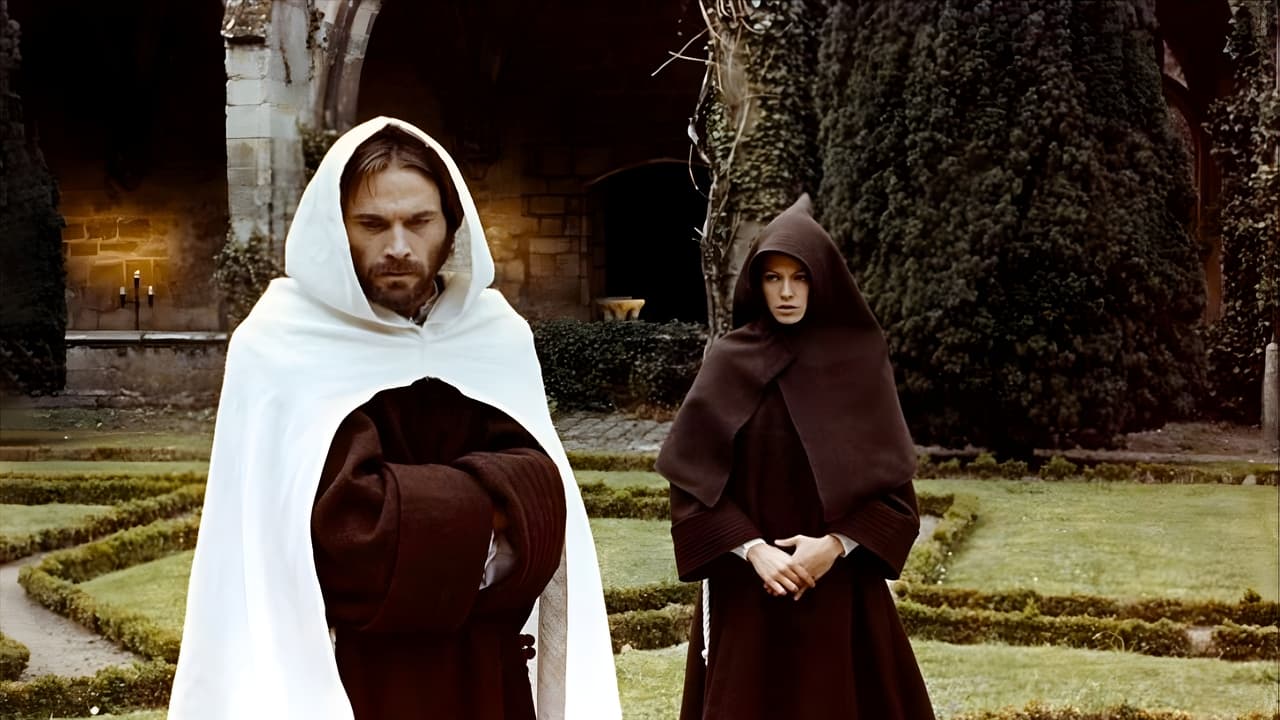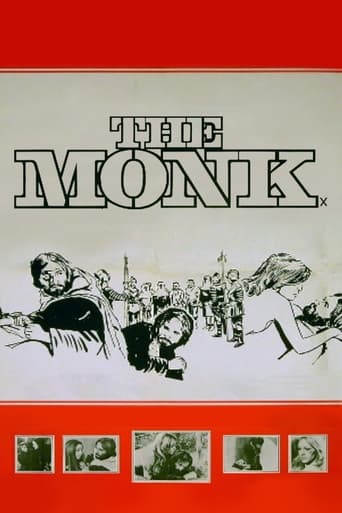



Slow pace in the most part of the movie.
The film makes a home in your brain and the only cure is to see it again.
View MoreWatching it is like watching the spectacle of a class clown at their best: you laugh at their jokes, instigate their defiance, and "ooooh" when they get in trouble.
View MoreAn old-fashioned movie made with new-fashioned finesse.
View MoreTHE MONK is an Italian adaptation of the famous gothic horror novel by Matthew Lewis of the same title. It's a controversial book that's gone down in infamous history, but the resultant film is merely dark and dour and in no particular way shocking. The screenplay was by Luis Bunuel, who must have been having an off day, and the main actor is Franco Nero, giving one of his most subdued and least interesting performances. He plays the titular character who succumbs to temptation when visited by the devil in disguise, but this loose adaptation is dank and decrepit, dull and drawn-out. Nicol Williamson's larger than life cameo as a crazy aristocrat is the highlight here.
View MoreI finally got hold of a copy of this film after searching for it for ages! I have to say this film version is better than I expected. I was sometimes reminded of The Devils by Russell, although I consider that a superior film. The Monk is one of my favourite books, I love its lurid, intricate plot. Of course here not everything has been brought on the screen from the book, I guess a mini series could be better suited to do that. The omission of several characters with their secret connections suddenly coming to light, took away one of the features I enjoyed the most of the book, however I think Natalie Delon was perfectly suited to play Mathilda, she is exactly how I imagined her from the book. Antonia is also well portrayed. While I think physically Franco Nero suits the role of Ambrosio very well, I don' t know, I found his performance a bit uninspired in certain scenes. Maybe the character of such a weak, corrupted man, did not suit his acting abilities? I also found the final scene, when you see Ambrosio as pope in modern times, very random. I prefer the book' s final scene. Overall though I enjoyed the film and will probably watch it again in some time.
View MoreCo-scriptwriter Luis Bunuel being my favorite film-maker, this is one of the Cinema's greatest cases of what could have been – were he to have directed it himself (as was the intention originally and a personal lifelong dream for him)! As for myself, the resulting film was so rare that I despaired of ever being able to catch it and, in fact, had even purchased the classic source material by Matthew Gregory Lewis to make up for this loss though, being quite voluminous, I have kept postponing its reading ever since! However, while in Hollywood in early 2006, I happened upon a DVD rental store which specialized in cult, hard-to-find titles and, sure enough, a copy of THE MONK (in English with unremovable Greek subtitles) was readily available, and which I promptly checked out. Eventually, I tried to obtain a copy for myself but I could only muster an unsubtitled version in French (the film was an international co-production between France, Italy and West Germany). Recently, though, I came across others in Italian and English – naturally, I opted for the latter (since, in all probability, that is how it was shot anyway) but it turned out to be an exceedingly dark edition (which unfortunately obscured much of the detail)! Anyway, the film is good-looking, thematically intriguing, and typically scathing of virtually all institutions and classes – but, for a variety of reasons, it does not quite pull as much punch as it should have. To be fair to its director (a former movie critic who had actually authored one of the first and most renowned studies of Bunuel's work!), its ultimate failure has a lot to do with the fact that Ken Russell's THE DEVILS (1971) had practically just touched upon most of its concerns, and with such a sledge-hammer attitude that the essentially inexperienced Kyrou's treatment comes across as altogether restrained (though, clearly, not without its moments of power)! Even so, a later Anglo-Spanish version was shot in 1990 and, reportedly, a Franco-Spanish one (starring Vincent Cassel and Geraldine Chaplin) is currently in production.As for Bunuel himself, he had already dealt with the notion of a holy man (here a somewhat out-of-his depth Franco Nero, from the Spanish Surrealist's own TRISTANA [1970]) being tempted by Satan in the guise of a luscious female (Nathalie Delon) in his last Mexican venture i.e. SIMON OF THE DESERT (1965). Incidentally, the two leads' heavy accent makes the dialogue fairly unintelligible at times; with this in mind, Nicol Williamson relishes his part of a debauched aristocrat (a paedophile with, possibly, cannibalistic tendencies!) and easily walks away with the acting honors.Needless to say, for all its faults, the film contrives to keep intact the numerous delightful Bunuelian touches found in the script (which the latter penned in conjunction with his regular collaborator Jean-Claude Carriere, who would return to much the same subject more than 30 years later for Milos Forman's GOYA'S GHOSTS [2006]): Williamson's charges enacting a Good Friday procession; a priest having a heart attack after listening to the misguided monk's confession (held in awe up till then by one and all for his inveterate piety – when he denounces a pregnant novice, she curses him with the hilarious "May your cock dry up and shrivel like parchment!" – and fervent pulpit rhetoric); a pubescent girl whom the monk lusts after and seduces, with the aid of black magic, metamorphosing into her disillusioned mother (whom, in his confused state, he stabs) and back again; similarly, the Devil-woman goes from friar's habit (nobody seems to notice her sex before she literally reveals herself to the hero, eventually growing jealous of his attentions for the underage commoner!) to elegant clothing as Williamson's companion to being brought in chains (along with Nero himself) before the Inquisition and, after having symbolically emasculated the latter, reverting to her lady-like demeanor for the finale; this coda, then, is surely among Bunuel's most perverse (amusingly, the crowd scenes inserted at Nero's unheralded Pontification – it is interesting that the Italian star would feature that same year in a film where a woman unaccountably rises the ranks to become Leader of the Catholic Church, POPE JOAN – are probably stock footage of recent vintage showing people anxiously waiting for the solemn announcement!).P.S. I preceded this viewing with Kyrou's absurdist 1961 short THE HEAD OF HAIR, in which Michel Piccoli obsesses romantically over an ancient wig and ends up institutionalized.
View MoreThis defies description. It is like Branded to Kill, in that it is so unlike anything else you have ever seen, it compels you just to watch it. Nicol Williamson gives a dazzling performance as a cannibalistic nobleman, the inquisition make a surprise appearance, sex and black magic how can it go wrong. It is hard to take this film seriously, ie when the monk makes a confession. What does it all mean, who know? It seems anti clerics, in that the clerics seem to be even more repugnant than the devil worshipping villains, who at least seem to be enjoying themselves. Watch and enjoy.
View More